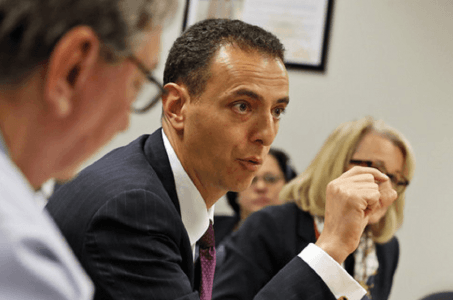Congressman Demands DOJ Opinion on Sports Betting, Calls for Federal Regulation
Posted on: November 18, 2018, 12:00h.
Last updated on: November 18, 2018, 04:50h.
US Representative Jim Sensenbrenner (R-Wisconsin) believes the “worst option” for the federal government is to defer completely to states on sports betting regulation.

In a letter addressed to US Deputy Attorney General Rod Rothstein, dated November 15, Sensenbrenner writes that it’s “clear Congress had work to do to endure the public is protected, and any potential for exploitation is minimized in this post-PASPA era” and promised a “legislative response.”
In the meantime, he wants to know the DOJ’s position on sports betting and queries whether it is prepared to reconsider its position on the Wire Act.
On May 14, 2018, the US Supreme Court rejected PASPA, the federal law that prohibited state-sanctioned sports betting, calling it “a direct afront to state sovereignty.”
“Congress can regulate sports gambling directly, but if it elects not to do so, each state is free to act on its own,” ruled the SCOTUS majority.
Wire Act Fixation
The decision has paved the way for the states to legalize sports betting within their borders if they choose to do so. State legislators would largely prefer the federal government to stay out of it — but a small number of US Congressman, including Sensenbrenner, Senate Minority Leader Chuck Schumer (D-New York), and Senator Orin Hatch (R-Utah) believe federal regulation is necessary.
Sensenbrenner is chairman of the House Subcommittee on Crime, Terrorism, Homeland Security and Investigations, which held a federal hearing on the issue in September.
The committee’s decision to invite the Coalition to Stop Internet Gambling to testify, meant that unfortunately much of the discussion veered off topic — to the Wire Act and a 2011 DOJ legal opinion that paved the way for state-regulated online casino gaming and poker.
In his letter, Sensenbrenner remains fixated on the DOJ’s 2011 opinion, despite its irrelevance to the topic, and demands to know whether Rothstein supports the opinion.
Barking Up the Wrong Tree
The Wire Act prohibits interstate sports betting but since states are only interested in regulating intrastate sports betting it’s a moot point — unless the wider objective is to ban all forms of online gambling in the US.
Sensenbrenner also asks Rothstein what “guidance, if any, is the DOJ providing to states that enter the sports betting realm” and what issues — legal and illegal — he foresees if Congress does not act in response to the striking down of PASPA.
“Such wagering — combined with the issuance of an opinion by the previous administration’s Office of Legal Counsel reinterpreting the Wire Act — will allow for exploitation of Internet gambling by criminal and terrorist organizations to obtain funds, launder money, and engage in identity theft and other cybercrimes,” claims Sensenbrenner.
Related News Articles
Most Popular
FTC: Casino Resort Fees Must Be Included in Upfront Hotel Rates
Genovese Capo Sentenced for Illegal Gambling on Long Island
NBA Referees Expose Sports Betting Abuse Following Steve Kerr Meltdown
UPDATE: Former Resorts World & MGM Grand Prez Loses Gaming License
Most Commented
-
UPDATE: Whiskey Pete’s Casino Near Las Vegas Closes
— December 20, 2024 — 31 Comments -
Caesars Virginia in Danville Now Accepting Hotel Room Reservations
— November 27, 2024 — 9 Comments -
UPDATE: Former Resorts World & MGM Grand Prez Loses Gaming License
— December 19, 2024 — 8 Comments -
FTC: Casino Resort Fees Must Be Included in Upfront Hotel Rates
— December 17, 2024 — 7 Comments
















No comments yet